Document 1
Providing External Advice
Contents
Introduction ............................................................................................................................................ 2
The legislation ......................................................................................................................................... 2
Treatment Injury legislative criteria ........................................................................................................ 2
ACC treatment injury claim investigation ............................................................................................... 2
ECA reports ............................................................................................................................................. 3
Payment .................................................................................................................................................. 4
Privacy ..................................................................................................................................................... 4
Frequency of requests ............................................................................................................................ 4
Next steps ............................................................................................................................................... 4
Appendices: ............................................................................................................................................. 5
Appendix I - Letter of agreement ........................................................................................................ 5
Appendix II - Background to ACC and Definitions ............................................................................... 6
Appendix II - AC Act 2001 (Oct 2016) .............................................................................................. 10
Introduction
In New Zealand the right to take action for injury caused by accident (or injury caused by treatment)
has been replaced by the comprehensive cover provided by ACC. The impact of treatment injury falls
on patient, while the monetary costs of cover are borne largely by taxpayers and earners.
To maintain a consistent and fair approach to treatment injury claims ACC draws on assistance from
expert advisers both in-house and externally. High quality expert clinical advice is important in
ensuring all claims for injury caused by treatment are assessed on their merits and considered fairly
within the bounds of the AC Act. Reports from experts assist ACC in making decisions on claims and
in deciding whether to notify relevant authorities of a risk of harm to the public, so assisting
practitioners to learn from such events.
Providing external clinical advice involves providing a specialist opinion on the papers. We send a
request letter (see example in appendix); usually with a brief synopsis of the basis of the claim and
some questions that we need answered. Along with the letter; the expert clinical assessor ((ECA) is
provided with relevant clinical records, and a purchase order number to quote when invoicing ACC.
The legislation
This provides the framework under which we consider claims for cover. We do not expect the
external clinical advisor (ECA) to apply or refer to the legislation, as that is ACC’s role, however it is
probably useful for you to have an understanding of the legislative criteria for treatment injury:
Treatment Injury legislative criteria
In brief we need to determine:
• whether treatment was provided by a registered health professional or at the direction
of a registered health professional
• whether there is a personal injury (and not just symptoms)
• whether the personal injury is caused by treatment
• whether the physical injury was a necessary part of treatment or an ordinary
consequence of treatment taking in to account al the circumstances of treatment,
including:
O the person’s underlying health condition at the time of treatment: (underlying
condition may or may not be relevant to an injury) and
O the clinical knowledge at the time of treatment (for example what is clinical
knowledge now may not have been known at the time treatment was given)
• whether the injury is whol y or substantial y caused by an underlying condition
• whether the client unreasonably withheld their consent to undergo treatment
• whether the injury is solely attributable to a resource allocation decision
ACC treatment injury claim investigation
Once a treatment injury claim is lodged with ACC, we follow a process of establishing the basis of the
claim from the client’s perspective; we obtain a completed ACC2152 (Treatment Injury Claim form),
relevant clinical reports and records and then in complex cases we request relevant external clinical
advice from an advisor of the appropriate speciality/ies. In cases where there is potentially a failure
to treat /failure to treat in a timely manner, we will seek ECA from a peer of whoever provided the
treatment (or failed to provide the treatment). In addition, we may seek additional ECA to assist our
understanding about the nature of the person’s underlying health condition. An example of this,
with birth injury claims, we may seek an ECA report from a midwife, obstetrician and gynaecologist
and a paediatrician.
The treatment injury cover specialists have the delegation to determine cover on treatment injury
claims. They all have clinical backgrounds in various fields (nurses, midwives, pharmacists,
physiotherapists and doctors). Our team managers have clinical backgrounds and they validate the
cover decision once it is made. All claims are presented to a peer review panel to ensure there is
consistency and robustness of the cover decision. For really complex/high cost/high risk claims; we
put these claims to Complex Claims Panel. Panel comprises an ACC senior medical advisor, a
treatment injury medical advisor, team manager for cover and technical advisory (Chair), a
representative from legal services and a communications manager.
ECA reports
In essence our Cover Specialists use specialist advice to
inform their decision on whether a claim
does or does not meet the legislative criteria for treatment injury or consequential injury cover
(consequential injury cover is where the person has a covered ACC claim, they receive treatment for
this covered injury and as a result of that treatment sustain another injury). It is not your role to
decide if a claim did or did not meet the criteria for cover; your report would be used to assist us in
understanding the clinical aspects of the claim to enable us to make a decision.
A writing guide used by our medical advisors is available as a useful resource for you. Also appended
to this document is a copy of the letter that would come to you when we seek your advice. Your
advice report can be emailed to the requesting cover specialist with an email address like this
[email address] . We will provide you with feedback and at times may seek
clarification if needing to understand an aspect of your report. This is not a challenge to your clinical
knowledge; it is simply ACC seeking to understand all the clinical aspects of the claim as we apply the
legislative criteria.
From our external clinical advisors we need:
• Good detailed advice; that gives regard to the particulars of a claim; advice of a general
nature is difficult to rely on in a medico-legal context.
• A report that provides sound and relevant references to support the content carries weight;
for example guidelines for practice should be relevant to the time the treatment was
provided. Likewise any reference material should also be relevant to the time when
treatment was given.
• A report that is balanced and gives regard to all the evidence will carry more weight.
• The report should not make comment on whether cover should or should not be given.
• A report that demonstrates the ECA understands the legal test on causation is the ‘balance
of probability’ ( is it
more likely than not that x caused y) rather than medical certainty.
• Presentation is important; giving attention to spelling and grammar and readability
• Qualifications and being of good standing in the medical community are important. A
working specialist with up to date knowledge in their area of speciality is given more weight
• The external clinical advisor needs to be comfortable that their reports may at times be
referred to or called for by the Ministry of Health, the Health and Disability Commissioner
and the relevant professional body.
• Reports will from time to time also be part of evidence that is used when there are disputes
on cover and or come before the Court and quoted in decisions of the Court where there is
an Appeal of a review decision by either our client or ACC.
Payment
ACC is able to provide payment of $276.00 (inclusive of GST) per hour for ECA reports. You would
need to invoice ACC via your own letterhead (and not say a DHB letterhead) and quote the purchase
order number that wil be found in the letter seeking your opinion. Any queries re invoice payment
can be directed to9(2)(a)
@acc.co.nz. Disbursements are paid for the actual and
reasonable cost such as for phone calls, typing and copying, internet access and research, postage
and courier.
Privacy
ACC places enormous importance in maintaining the privacy of the client information we are
entrusted with. To that end,
• If a physical client file is required when providing advice, we send this by courier and it needs
to go to a
street address where someone wil be there to receive the parcel and sign for it. If
this means it is not suitable to send to your home address, do you have a secretary at your
place of work that it could go to? Physical client files can be destroyed by you if you have
access to secure destruction however if not, the file can be couriered back to ACC and you
can charge ACC for the disbursement.
• If the information is being provided by disc, this wil be password protected and the
password emailed to you.
• If information is provided via email; files attached to email are password protected and a
separate email wil be sent with a password you can use to open any files you receive.
Frequency of requests
This is for your determination. If you only want one request at a time to provide a report, please let
us know as we appreciate that you are very busy. What is important is that you commit to providing
your report by the due date noted in the letter of request; as overdue reports cause our clients
significant distress. They are unable to access any assistance from ACC while cover is pending
therefore the longer it takes to obtain al information required to determine cover (and this can
include your advice report), the longer the client is waiting.
Next steps
Please have a read of the attached and confirm you are ready to proceed. You can call or email if you
would like further information about providing advice. You will also need to complete and send to
the following (by hard copy or scanned):
• The completed vendor registration form
• A copy of your bank deposit slip
• A copy of your current CV
Appendices:
Appendix I - Letter of agreement
Appendix II - Background to ACC and Definitions
Background to ACC
The Accident Compensation Corporation (ACC) has provided comprehensive, no fault cover for
people injured in accidents since 1974.
The right to take legal action for personal injury covered by ACC is removed other than for
exemplary damages.
Levies from workers, employers, vehicle registrations, motor fuel and taxpayers support the
recovery of people with injuries and are managed to fund the future predicted needs of people with
accepted claims.
ACC assistance is available to all New Zealand residents and temporary visitors to New Zealand.
Residents
may also be covered if they are injured overseas, with assistance available on their return.
New Zealand residents who suffer an injury from medical treatment overseas may be covered
although restrictions apply. ACC assistance is available in New Zealand.
Once a claim is approved by ACC, an injured person may have access to a range of entitlements from
treatment and rehabilitation aids, to weekly compensation and lump sum compensation, depending
on the injury and the person’s circumstances.
From medical misadventure to treatment injury
Law changes since the scheme’s introduction have also seen the criteria for cover evolve. The
Accident Compensation Amendment Act 1974 added “medical, surgical, dental, or first-aid
misadventure” as an accident category.
Between 1992 and 2005, cover was available for medical misadventure. The Accident Rehabilitation
and Compensation Insurance Act 1992 included specific categories of medical misadventure, namely
“medical error” (failure) or “medical mishap” (injuries that were both a rare and severe outcome
from properly given treatment).
Changes in 2005 reduced the need to find fault as the cause of an injury, but finding that a health
professional could and should have taken an alternative treatment pathway is still one several
‘causes’ of a treatment injury.
What is the “accident” for treatment injury claims?
A treatment injury is a physical injury caused by treatment from a registered health professional —
but some exclusions apply.
The “accident” event is treatment by, or at the direction of a registered health professional. The
definition of treatment is broad and includes diagnosis, treatment decisions, as well as omission or
failure to provide treatment.
There is no requirement to find fault, although in some cases the cause of the injury will be
treatment that is inappropriate in the circumstances.
Exclusions from treatment injury
Both the underlying disease that led to treatment and other pre-existing diseases are not covered,
although a significant worsening of disease caused by treatment
may be covered.
Also
excluded are:
• a necessary part of the treatment (for example a skin puncture or surgical incision or the
removal of a body part when those are a necessary part of the treatment required)
• the ordinary consequences of treatment (for example hair loss following chemotherapy or
radiotherapy burns are unlikely to be covered)
• injury caused solely by decisions about allocating health resources (such as waiting list
delays for joint replacement surgery)
• injury caused because a patient unreasonably delayed or refused to give consent for
treatment.
• treatment that does not achieve the desired result is not a treatment injury.
The claims process
Information on the process is available from the ACC website. http://www.acc.co.nz/making-a-
claim/index.htm With assistance from a registered health professional an injured person can lodge a
treatment injury, with ACC. This involves completing an ACC45 Injury Claim Form and submitting this
to ACC together with an ACC2152 Treatment Injury Claim Form. If more information is needed, ACC
may contact the treatment provider with the injured person’s consent.
If the claim is approved ACC will pay the treatment provider’s invoices and give appropriate
entitlements to the injured person. Only a registered doctor or a nurse practitioner can certify work
incapacity.
Complex claims
AC legislation describes some claims for cover as “complicated”. These claims take more time to
assess because of the additional information needed. Complicated claims include personal injuries
caused by treatment and claims lodged more than 12 months after the date the personal injury
occurred.
When assessing complicated claims, ACC may seek the consent of the patient to contact their
treatment providers seeking additional information.
Entitlements
Once a claim has been accepted, ACC will contribute to the costs of rehabilitation and treatment,
and provide financial support to the injured person. The amounts depend on the injury and
circumstances of the injured person.
An entitlement is the term for ACC's contributions to rehabilitation and compensation. This includes:
• rehabilitation and treatment (including pharmaceuticals, x-rays, elective surgery), home-
based care, and consumables
• support with transport, housing modifications, and equipment
• services aimed at restoring health and independence
• compensation for lost earnings as a result of the injury
• death benefits such as funeral grants and payments to dependants
• an independence allowance for injuries that occurred before 1 April 2002
• lump sum compensation for injuries that happened on or after 1 April 2002.
Serious Injury
The term serious injury is a classification ACC created for people who will have a lifelong relationship
with ACC due to the nature of their injury, eg damage to the spinal cord or brain.
Reporting of risk of harm from treatment injuries
Since 1 July 2005, ACC is able to report a belief of risk of harm to relevant authorities. After making
the decision on whether to accept a claim, ACC staff review information on file to consider if there is
a risk of harm to the public.
Harm assessments are conducted on decided (both accept and declined claims) and notifications
made based on the likelihood of the event recurring in the future and the potential consequence of
the event. The claim notification date could be in the year following the claim cover decision date.
ACC reports injuries that are sentinel events or serious events with a high or moderate likelihood of
reoccurring.
Sentinel events are events during care or treatment that have resulted in
an unanticipated death or
major permanent loss of function not related to the natural course of the claimant’s il ness or
underlying condition, pregnancy or childbirth.
A serious event (or pattern of events) is an event that
has the potential to result in death or major
permanent loss of function not related to the natural course of the claimant’s il ness or underlying
condition.
Sentinel and serious events may be notified to a health professional registration authority if ACC
reasonably believes they pose a risk of harm, are clearly related to an individual professional and
have peer advice regarding the appropriateness of care from either:
• The Health and Disability Commissioner’s office,
• The Coroner’s office, or
• An ACC External Clinical advisor.
Selected definitions relating to treatment injury
Injury caused by accident
Cover is provided for “personal injury” that is caused by:
• an accident
• a work-related gradual process, disease or infection (WRGPDI)
• treatment that was provided by a registered health professional (treatment injury)
Personal injury
Personal injury includes death, a physical injury, and damage to dentures or prostheses that replace
a part of the human body (hearing aids, spectacles and contact lenses are specifically excluded in the
definition of prosthesis).
With limited exceptions gradually developing health conditions are not covered by ACC. Similarly
personal injury caused by natural use of teeth or due to wear and tear or the ageing process are not
covered by ACC.
Physical injury
The most common type of personal injury is a physical injury – which is ‘
actual bodily damage’. Pain
by itself, or discomfort, or minor symptoms are not sufficient.
Mental Injury
Cover is also available for mental injuries that result from a physical injury, including treatment
injuries. A mental injury is a
clinically significant behavioural, cognitive or psychological dysfunction.
It does not include emotional effects such as hurt feelings, stress or loss of enjoyment.
Treatment provider
Acupuncturist, audiologist, chiropractor, counsellor, dentist, medical laboratory technologist, nurse,
nurse practitioner, occupational therapist, optometrist, osteopath, physiotherapist, podiatrist,
medical practitioner, or speech therapist.
Registered health professional
A chiropractor, clinical dental technician, dental technician, dentist, medical laboratory
technologist, medical practitioner, medical radiation, technologist, midwife, nurse, nurse
practitioner, occupational therapist, optometrist, pharmacist, physiotherapist, or podiatrist.
Fatal claims
When someone dies from a treatment injury, ACC can provide financial support to the
family of the deceased, including a contribution to the funeral costs and financial assistance
to dependants.
Date of injury
The date of a treatment injury is the date the person first sought or received treatment for
the symptoms of the injury.
Consequential claims
A consequential treatment injury is an injury that occurs during treatment for an already
covered personal injury.
Appendix II - AC Act 2001 (Oct 2016)
32 Treatment injury
(1) Treatment injury means personal injury that is—
(a) suffered by a person—
(i) seeking treatment from 1 or more registered health professionals; or
(i ) receiving treatment from, or at the direction of, 1 or more registered health professionals; or
(ii ) referred to in subsection (7); and
(b) caused by treatment; and
(c) not a necessary part, or ordinary consequence, of the treatment, taking into account al the
circumstances of the treatment, including—
(i) the person’s underlying health condition at the time of the treatment; and
(i ) the clinical knowledge at the time of the treatment.
(2) Treatment injury does not include the fol owing kinds of personal injury:
(a) personal injury that is whol y or substantial y caused by a person’s underlying health condition:
(b) personal injury that is solely attributable to a resource al ocation decision:
(c) personal injury that is a result of a person unreasonably withholding or delaying their consent to
undergo treatment.
(3) The fact that the treatment did not achieve a desired result does not, of itself, constitute treatment injury.
(4) Treatment injury includes personal injury suffered by a person as a result of treatment given as part of a
clinical trial, in the circumstances described in subsection (5) or subsection (6).
(5) One of the circumstances referred to in subsection (4) is where the claimant did not agree, in writing, to
participate in the trial.
(6) The other circumstance referred to in subsection (4) is where—
(a) an ethics committee—
(i) approved the trial; and
(i ) was satisfied that the trial was not to be conducted principal y for the benefit of the
manufacturer or distributor of the medicine or item being trial ed; and
(b) the ethics committee was approved by the Health Research Council of New Zealand or the Director-
General of Health at the time it gave its approval.
(7) If a person (person A) suffers an infection that is a treatment injury, cover for that personal injury extends
to— (a)person A’s spouse or partner, if person A has passed the infection on directly to the spouse or
partner:
(b) person A’s child, if person A has passed the infection on directly to the child:
(c) any other third party, if person A has passed the infection on directly to that third party:
33 Treatment
(1) For the purposes of determining whether a treatment injury has occurred, or when that injury occurred,
treatment includes—
(a) the giving of treatment:
(b) a diagnosis of a person’s medical condition:
(c) a decision on the treatment to be provided (including a decision not to provide treatment):
(d) a failure to provide treatment, or to provide treatment in a timely manner:
(e) obtaining, or failing to obtain, a person’s consent to undergo treatment, including any information
provided to the person (or other person legal y entitled to consent on their behalf if the person does
not have legal capacity) to enable the person to make an informed decision on whether to accept
treatment:
(f) the provision of prophylaxis:
(g) the failure of any equipment, device, or tool used as part of the treatment process, including the
failure of any implant or prosthesis (except where the failure of the implant or prosthesis is caused by
an intervening act or by fair wear and tear), whether at the time of giving treatment or subsequently:
(h) the application of any support systems, including policies, processes, practices, and administrative
systems, that—
(i) are used by the organisation or person providing the treatment; and
(i ) directly support the treatment.
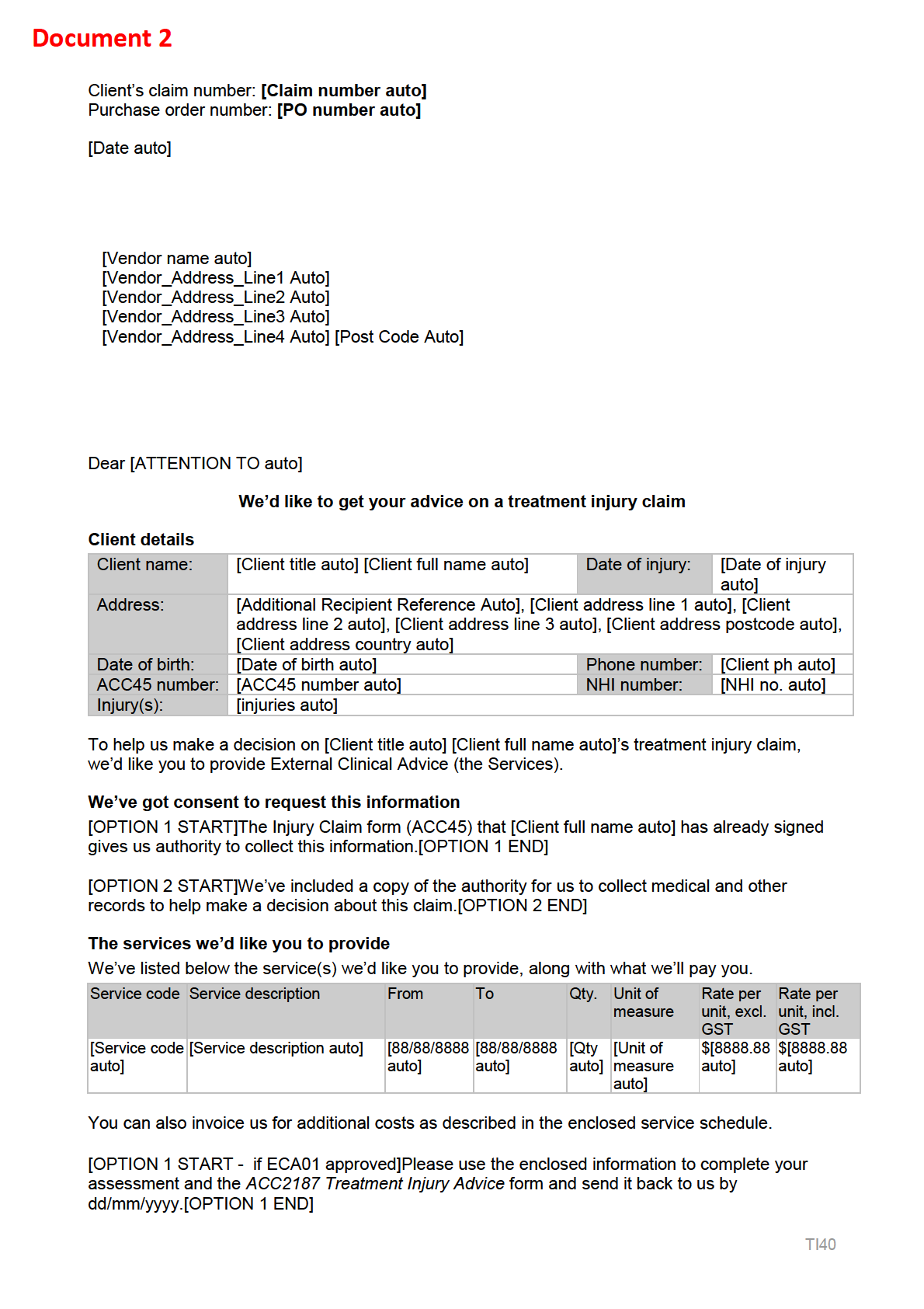
[OPTION 2 START - use if ECA02 approved]We’d like you to attend an advisory panel. We’l be in
touch to provide more details about the time and location of the panel.[OPTION 2 END]
[OPTION 3 START - use if ECA03 approved]We’d like you to attend a review hearing in person /
by teleconference. Fairway Resolution Limited wil arrange the review hearing with [Client first
name auto]. We’ll be in touch to provide more details about the time and location of the review
hearing soon.[OPTION 3 END]
Service requirements
Thank you in advance for filling out the external clinical advice report. Your prompt reply wil help
us make a decision on this claim quickly.
If you’re unable to meet the timeframe, please call
me to organise a new time.
Please see below the service schedule for more details about what you need to know when
providing the service.
How to invoice us
You can invoice us using our online services. You just need to make sure that you include the
claim number, purchase order number and service code(s) shown on this letter.
If you’d like more information about how to send us your invoices electronically, please get in touch
with the eBusiness team on 0800 222 994 option 1 or email [email address].
We’re here to help
If you’d like to talk about this letter or have any questions, please just get in touch with me using
the contact details below.
Yours sincerely
[Current User auto]
[Job Title auto]
Telephone: [INSERT phone number]
Encl.
ACC External Clinical Advice Service schedule, [OPTIONAL]ACC2187 Treatment Injury
Advice template, [OPTIONAL]ACC6300 Authority to collect medical and other records
TI40
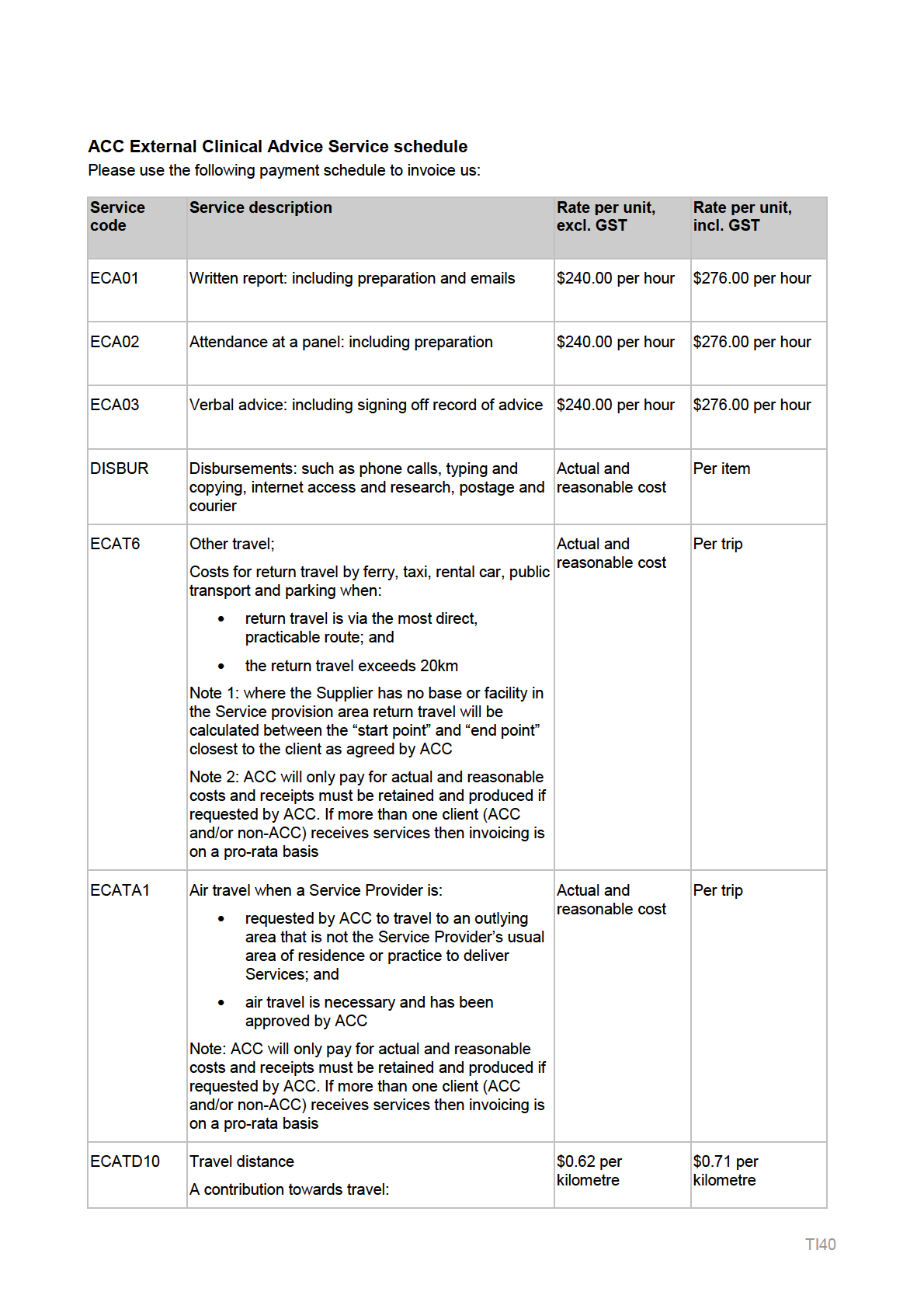
•
for return travel via the most direct,
practicable route; and
•
where the return travel exceeds 20km
Note 1: where the Supplier has no base or facility in
the Service provision area, return travel wil be
calculated between the “start point” and “end point”
closest to the client (as agreed by ACC)
Note 2: ACC does not pay for the first 20km of travel
and this must be deducted from the total distance
travel ed. If travel includes more than one client
(ACC and/or non-ACC) then invoicing is on a pro-
rata basis
ECATT5
Travel time - first hour
$120.00 per first $138.00 per first
Paid for the first 60 minutes (or less) of total travel in hour
hour
a day where:
•
the travel is necessary; and the Service
Provider travels via the most direct,
practicable route between their base/facility
and
•
where the services are provided; and the
distance the Service Provider travels
exceeds 20km return; and/or
•
the time the Service Provider travels
exceeds 30 minutes
Note 1: where the Supplier has no base or facility in
the Service provision area return travel wil be
calculated between the “start point” and “end point”
closest to the client (as agreed by ACC)
Note 2: if travel includes more than one client (ACC
and/or non-ACC) then invoicing is on a pro-rata
basis
ECATT1
Travel time – subsequent hours
$240.00 per
$276.00 per
Paid for return travel time after the first 60 minutes in subsequent
subsequent
a day paid under ECATT5, where:
hour(s)
hour(s)
•
the travel is necessary; and
•
the Service Provider travels via the most
direct, practicable route available between
their base/facility and where the services are
provided; and
•
additional travel time is required after the
first hour of travel
Note 1: where the Supplier has no base or facility in
the Service provision area return travel wil be
calculated between the “start point” and “end point”
closest to the client as agreed by ACC
Note 2: the first 60 minutes must be deducted from
the total travel time and if travel includes more than
one client (ACC and/or non-ACC) then invoicing is
on a pro-rata basis
TI40
You’l need to provide evidence of any costs you incur plus get prior approval from us for any travel by air,
bus or train. We’ll usually make the travel booking for you unless we agree to do otherwise.
Things you should know when providing the service(s)
If the Service changes, we’l talk to you about the changes and agree in writing, which might be by
email. Along with the report we wil own all the intellectual property in the materials you deliver to
us relating to the Services.
Your name wil be in our decision letter and report so if you get contacted by the client or health
provider about the report, please direct them to ACC. It’s important you don’t enter into any
discussions with them about this.
Let us know immediately if you become aware of a conflict of interest at any time. If this happens
we ask that you return the request to us within five working days and we’l cancel it. The same
applies if you become aware of any issue relating to ACC, the Services and/or the purpose of this
letter which has or might have media or public interest.
For privacy reasons please make sure you keep all information about the client and your Services
confidential unless agreed to by ACC or required by law. Either of us may for any reason terminate
the Services on giving one weeks’ written notice to the other party without being liable to the other
party for any damages or compensation.
Acting as a Third Party Assessor
As an external clinical advisor you wil carry out services in a competent and professional manner
and in accordance with al applicable legislation and professional standards, including the:
•
High Court rules in Part 9, Subpart 5 of the High Court Rules 2016: Expert witness to comply
with code of conduct (see
http:/ www.legislation.govt.nz/regulation/public/2016/0225/latest/DLM6951902.html) (with
appropriate modifications) Privacy Act 1993
•
Health Information Privacy Code 1994.
TI40
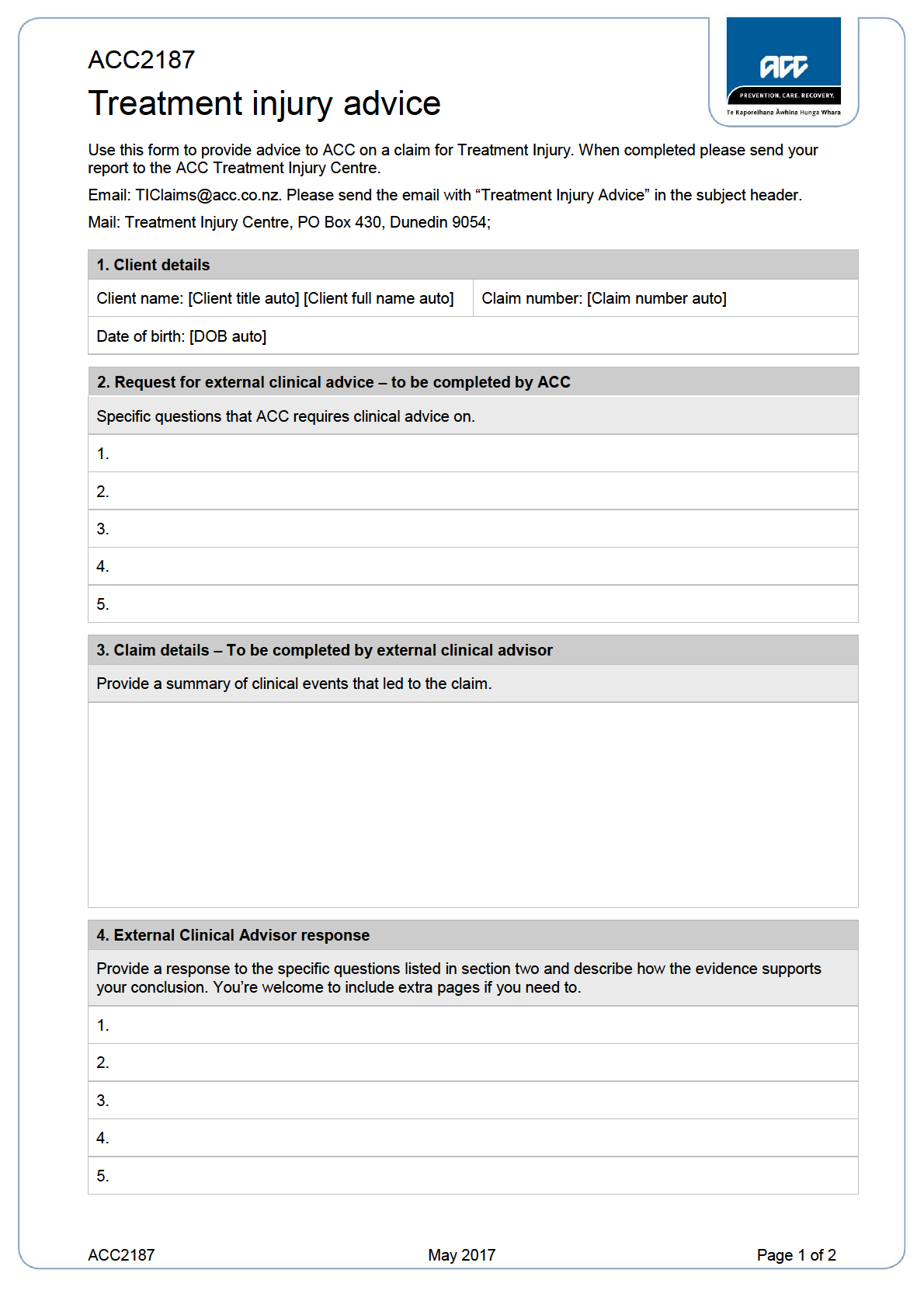
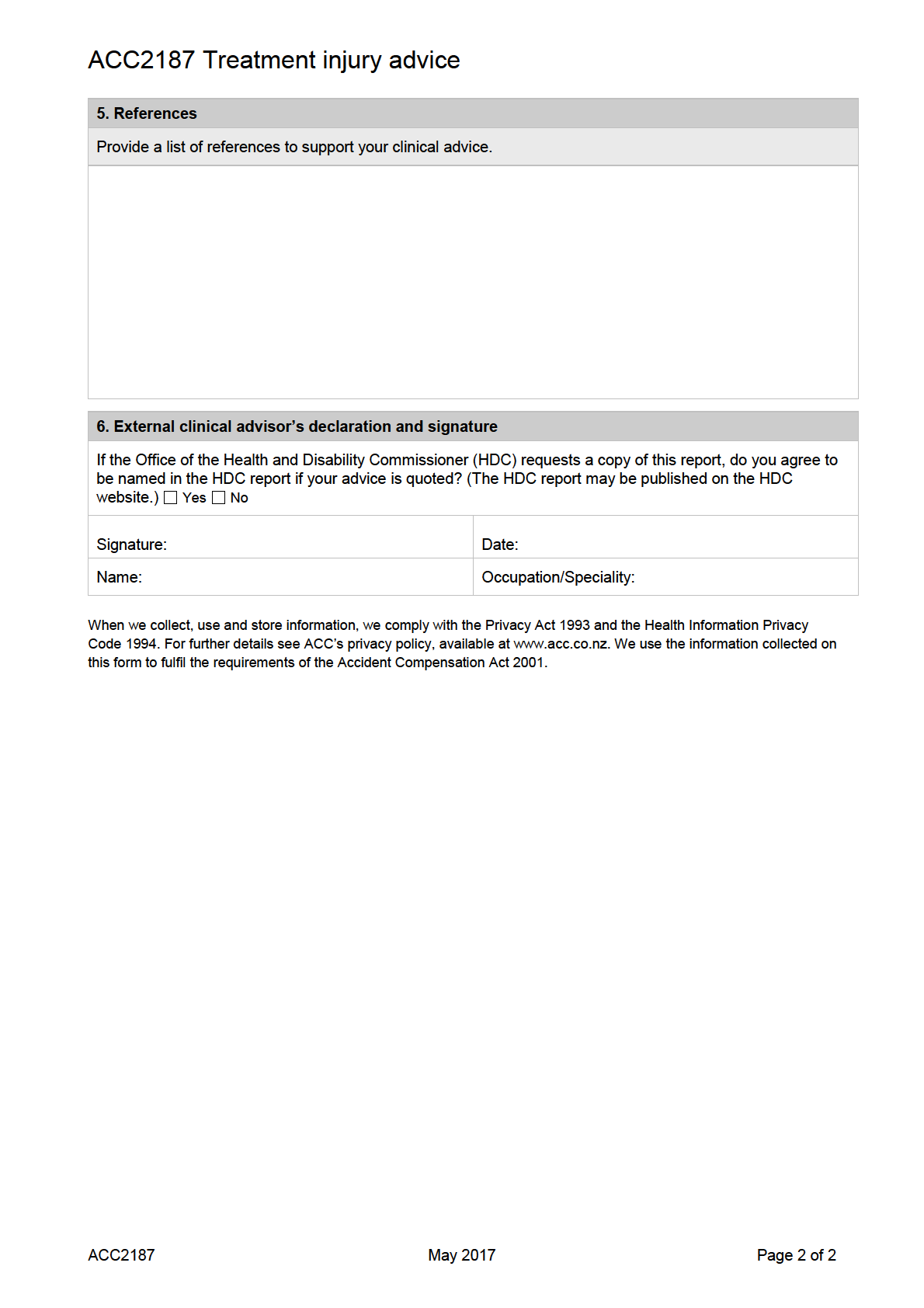
 Document 3
V3
ACC-Treatment Injury Cover
Assessment Centre:
External Clinical Advice Guide
We rely on your clinical advice to assess complex treatment injury claims
May 2018
Document 3
V3
ACC-Treatment Injury Cover
Assessment Centre:
External Clinical Advice Guide
We rely on your clinical advice to assess complex treatment injury claims
May 2018
External Clinical Advice Guide
May 2018
1. Purpose
This External Clinical Advisor Guide informs you of:
• your role as an External Clinical Advisor (
ECA)
• ACC’s role
• the treatment injury provisions.
2. External Clinical Advisor: your role
Impartial clinical advice helps us arrive at a decision for the client
Your role is to provide impartial advice to ACC in keeping with professional requirements for honest,
accurate, objective reports that are delivered promptly and are based on relevant information.
You should give opinions only on matters within your area of expertise. If you do not consider yourself
suitably qualified to provide the advice, you should notify the person at ACC who requested it.
It is essential that your advice is free from bias or any appearance of bias. The test for bias is whether
there is any risk, or perceivable risk, that the ECA might unfairly favour or disfavour the injured person
they have been asked to advise on. Any personal connection with the injured person must be disclosed to
ACC at the time advice is sought.
Quality of advice
Your advice must be accurate and shouldn’t be speculative or be based on insufficient or flawed
information. If you are not satisfied that a medical opinion can be accurate, based on all the information
provided in the file, you must clearly state this in the report.
If you use references to substantiate or qualify your opinion these must be from reputable medical
journals, or medical webpages used by your profession.
Consultation and review
It is acceptable to discuss issues with a professional col eague; provided the col eague has no connection
to the claim and no identifying details are revealed. Where input of this nature helps to form your
opinion, it needs to be referenced in your report, including the qualifications of the colleague.
Timeliness
ACC recognises that as a registered health practitioner your first priority is to the patients you see and
treat every day, as a result we understand that completing clinical advice for ACC can take up to a few
weeks.
If for whatever reason your advice is likely to take longer than this please let us know. We will either make
alternate arrangements, or at least we will be able to inform the client why there is a delay.
Similarly, where there is urgency in receiving your advice we will let you know.
In relation to frequency of requests, this is for your determination. If you only want one request at a time
to provide a report, please let us know as we appreciate that you are very busy
ACC-Treatment Injury Cover Assessment Centre
Page 2 of 6
External Clinical Advice Guide
May 2018
Privacy
Privacy is a core focus area for ACC. ACC’s privacy policy (available
here), publicly available on its website,
sets out the principles used by ACC to col ect, use, disclose and store personal and health related
information. You should manage personal information carefully and respectfully.
3. ACC’s role
We issue a decision based on al the relevant clinical information on file
The role of an ECA is to provide clinical expertise to ACC. When asked to provide your opinion on a claim,
ACC will provide you with copies of clinical records and any relevant reports from other providers. You
will be asked specific questions to respond to. Please do not provide additional comment unless asked
and do not provide a cover decision recommendation. This is ACC’s role to determine cover.
Feedback: sometimes we may seek clarification or further comment
On receipt of your completed report we assess the summary and opinion provided. If we have any
outstanding questions or need to clarify a specific point with you, then we wil get in touch as your report
forms an important part of ACC’s decision-making process.
How the process works
All treatment injury claims are assessed by a Treatment Injury Cover Specialist, who typically has an allied
health background, eg nursing, physiotherapy or midwifery. Once they have received all the relevant
clinical information but outstanding questions remain, ECA advice may be sought.
The Claims Administrator facilitates this process by:
• contacting you and sending the report request(TI40 attached) via email
• depending on your preference emailing (password protected) or couriering the relevant clinical
information to a secure address
• via email confirms receipt of the completed advice with your invoice attached.
All clinical information provided to you must be securely destroyed. Physical files that cannot be securely
destroyed must be returned to ACC via courier.
ACC allows for up to five hours of reimbursement on a treatment injury report and this is set at $276 per
hour (incl. GST).1
Should you need to allocate significantly more time to complete a report then please inform the
Treatment Injury Cover Specialist who manages the claim.
4. The treatment injury provisions at a glance
Background:
The Accident Compensation Corporation (ACC) has provided comprehensive, no fault cover for people
injured in accidents since 1974. The right to take legal action for personal injury covered by ACC is
removed other than for exemplary damages.
1 This is subject to change.
ACC-Treatment Injury Cover Assessment Centre
Page 3 of 6
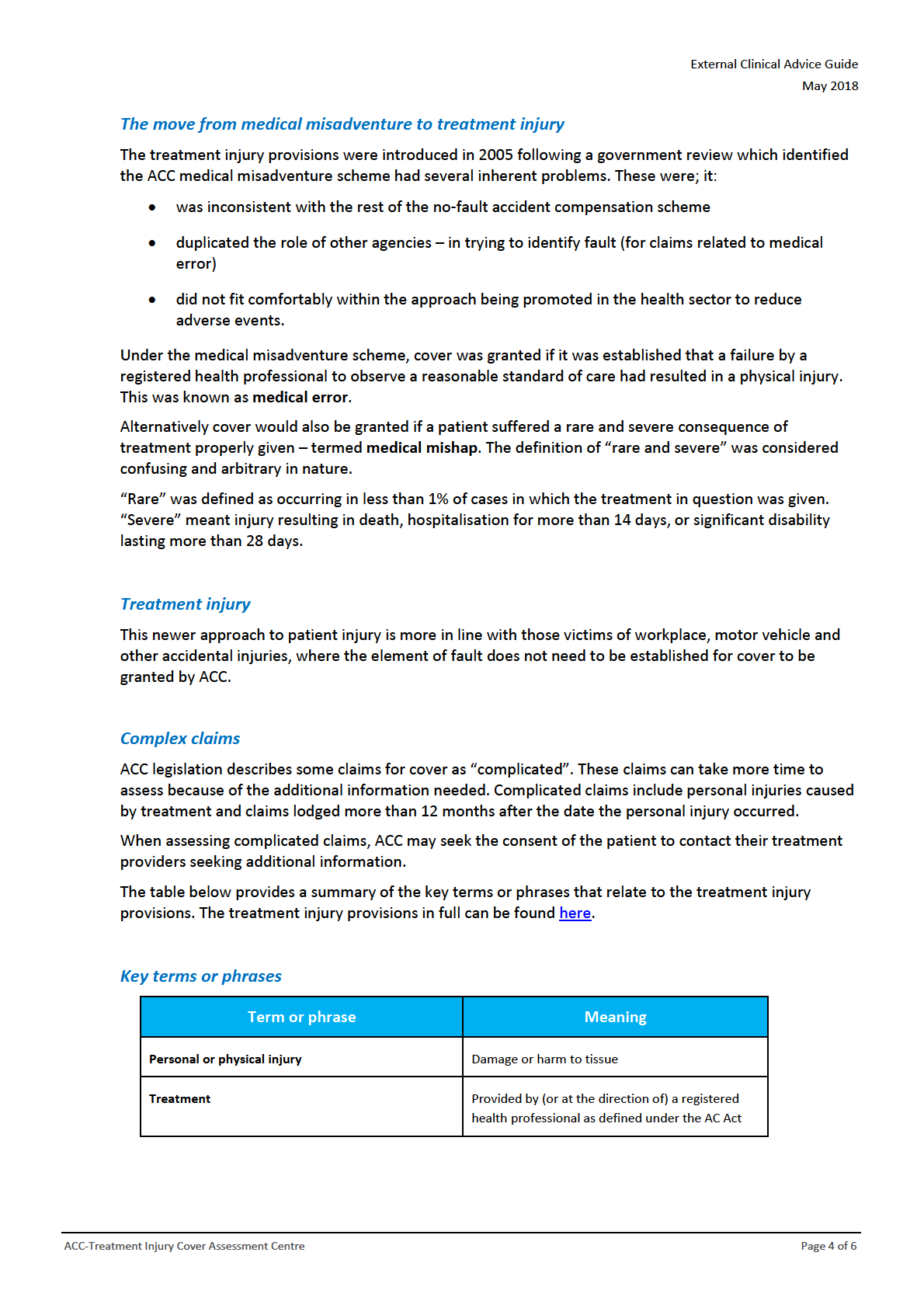
External Clinical Advice Guide
May 2018
Causation
A physical injury caused by treatment
Necessary part
A physical injury caused by treatment which was
intentional
Ordinary consequence
A physical injury caused by treatment that was not
unexpected given: the patient’s underlying health
condition and the clinical knowledge at the time
of treatment
Failure to provide treatment, or to provide
The registered health professional involved
could
treatment in a timely manner
and should have taken adopted a different
treatment pathway or provided different
treatment. What must be established is that a
failure to diagnose material y impacted on the
development of the disease to establish causation.
Reporting a belief of a risk of harm
ACC has a legal obligation to make a notification to the authority responsible for patient safety when we
believe there is a risk of harm to the public.
It is not ACC’s role to make any definitive findings. Nonetheless where we have legitimate concerns
regarding patient safety during the course of processing a claim we must pass this information on to the
relevant authority.
The treatment injury provisions, in part, were introduced to ensure ACC did not duplicate the role of other
agencies eg the Health and Disability Commissioner. The focus was on making the claim process simpler
and quicker, ensuring there is a climate of learning when things go wrong, and protecting patient safety.
This may mean we make a notification without all the relevant medical information to the authority
responsible.
6. Communication
If your circumstances or availability changes let us know
It’s real y important that the decision-making process is not unduly delayed for our clients so please tell us
how things are going and how many report request you can manage at a time. We understand that you
may not always be able to complete reports for us (due to annual leave) or your capacity to do them may
change – so just let us know.
Our aim is to foster a good working relationship as the role you play in helping us to assess claims for
treatment injury and reach a decision is vital.
We look forward to working with you.
ACC-Treatment Injury Cover Assessment Centre
Page 5 of 6
External Clinical Advice Guide
May 2018
Appendix - TI 40 Letter of agreement
ACC-Treatment Injury Cover Assessment Centre
Page 6 of 6





